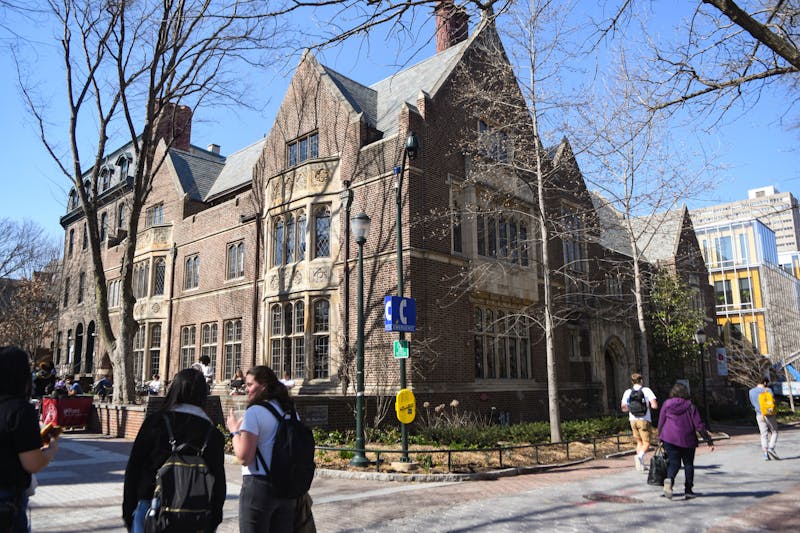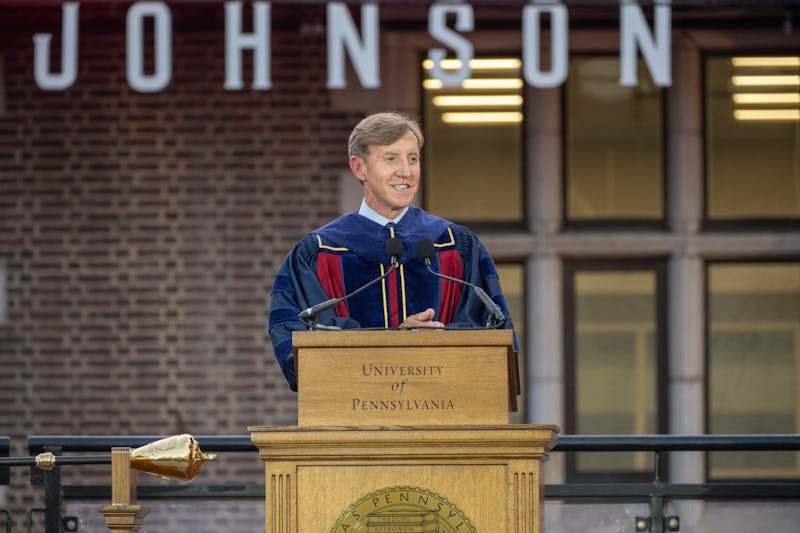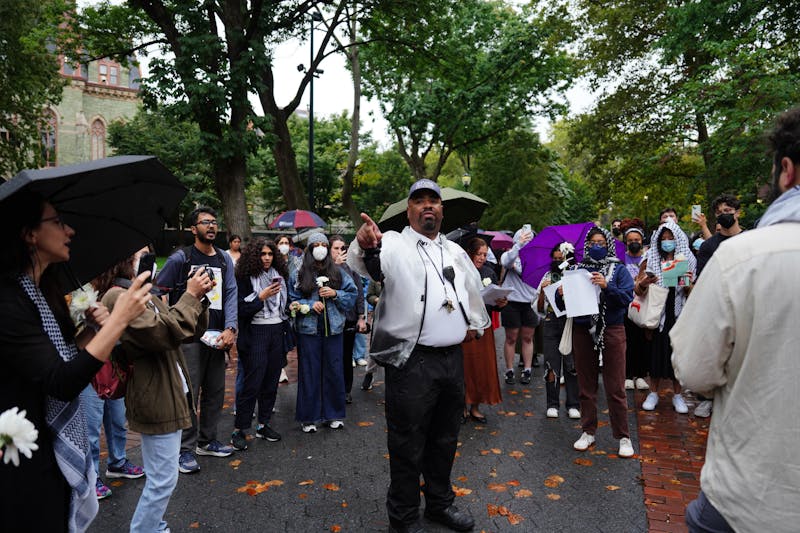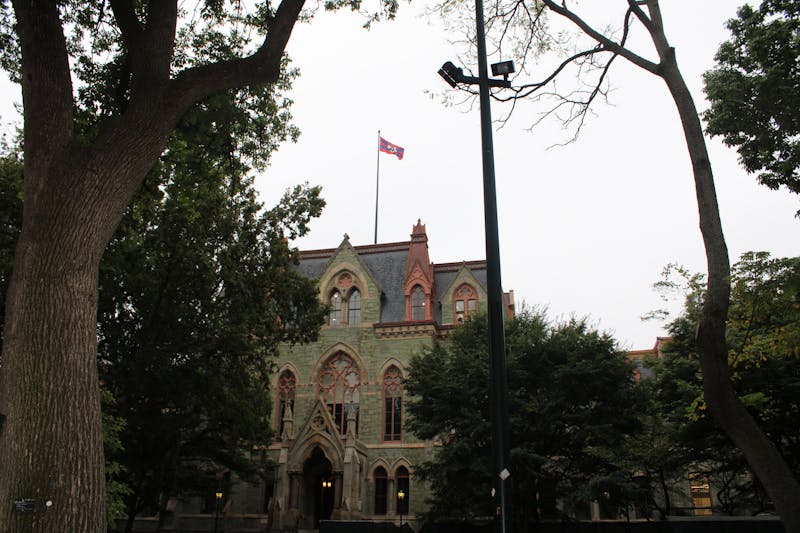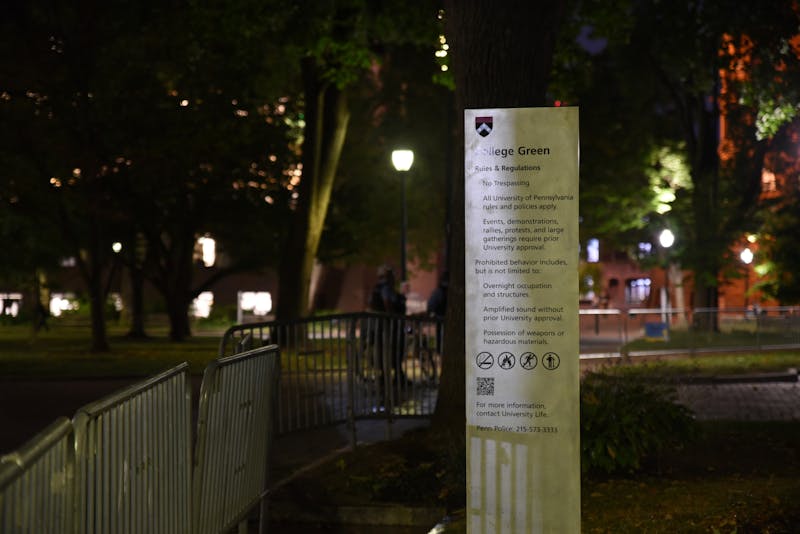
This past Friday, a group of Penn students and faculty gathered in front of Van Pelt-Dietrich Library to mourn civilian casualties in Gaza and Lebanon. The group was not large and did not use loudspeakers. Because the event was not registered with the University two weeks in advance, a requirement of one of many new Guidelines on Open Expression, all in attendance were considered to have been trespassing.
As soon as the event began, Penn security officers began shouting over the speakers, instructing everyone to move off campus. School administrators filmed everyone gathered and informed them they may be identified and reported for disciplinary processes. The LOVE statue, where organizers previously announced that the vigil would be held, stood gated off in the background. A dozen police officers surrounded the group carrying handfuls of zip-tie handcuffs. The threat of arrest loomed large.
I feel ashamed to be associated with a university that would silence and disrespect mourners in this way.
Watching this unfold from a few feet away, I saw parts of myself that have been unable to mourn represented in this group that was gathered. The ninth anniversary of my mom’s passing is in just a few weeks. It has taken me about as long to ever speak about the overwhelming loss I experienced. Out of a desire to make others comfortable and maintain my own sense of normalcy, I silenced the pain that I felt in every part of my body, until I too could not hear it.
Watching the vigil be forcibly dispersed, I recognized the residual trauma of having one’s grief denied. I was in disbelief to see that harm intentionally inflicted on members of my community.
The free speech protocol that led us to this situation is fundamentally broken.
People have the right to know what they know, feel what they feel, and do so publicly. Honesty with ourselves and others about the state of the world as we perceive it is how we integrate traumatic and painful experiences into a cohesive narrative that can facilitate healing. There is no intellectual conversation to be had about the ongoing war in the Middle East if the live, human reactions to that war are unwelcome on campus.
The University’s denial of mourners’ emotional reality does not neutralize their grief. It rather keeps those suffering in a cycle of dissonance and dissociation, where acknowledgment by the University requires silencing or minimizing one’s human reaction to sheer tragedy. I find that level of dehumanization to be reprehensible and deeply destructive.
Witnessing and making space for grief does not need to be controversial. I also acknowledge there is no helpful distinction between a vigil and a protest. Rather than attempt to delineate between the two, I focus on the emotional subtexts of all campus demonstrations. A gathering such as a vigil certainly has an important place on campus, and I also believe that even explicitly charged political rallies are communicating unmet needs held by protesters that they deserve to have heard and recognized. I believe that an approach of free speech near absolutism, allowing offended parties to fully and equally voice their discomfort, is the only way to guarantee that necessary expression and processing can take place on campus. Prioritizing an illusion of campus neutrality over the right of Penn students to authentically react to real-world events seems to me a troubling indicator of what is to come, especially as we approach the anniversary of the Oct. 7 Hamas attack on Israel.
Validating the grief one feels about witnessing death and destruction is also the necessary first step for any future engagement with others on the topic. The University’s acknowledgment of diverse, legitimate worldviews, contexts, and lived experiences, not the endorsement of specific opinions, is what gives students the confidence to later be challenged on those views by those with differing perspectives. Students cannot constructively work through trauma, grief, and rage while also convincing the University and campus community that their position exists in the first place.
Regardless of theoretical free speech discourse, the reaction of the University to Friday’s vigil crossed a clear line for me. The rules that precipitated it must be revised or rejected, or we risk stifling and thus exacerbating trauma held among those on campus that will inevitably boil over into harsher conflict.
I reject the notion that silencing real emotional experiences, as the current open expression guidelines do, will ever keep us safe. Giving students the latitude to process those emotions is our only viable means for a campuswide de-escalation after a yearlong power struggle that has significantly traumatized marginalized populations on campus. We are a community of people with messy and discordant feelings. Processing grief in my own life has taught me that about myself. Pretending those feelings don’t exist, or asking those who feel them to be out of sight, is fundamentally alienating.
Silencing mourners and their expression of grief is a scary position for the University to take. I found the events of last Friday to be borderline dystopian, and I fear that misguided campus policies have come to hold our own human sensibilities hostage. We can say enough is enough. Protect our community members’ right to publicly mourn. Acknowledge a diversity of legitimate worldviews, and don’t make students and faculty fight to have their basic emotional reality simply acknowledged. Give students and faculty the space to articulate themselves while they process disturbing real-world events as they transpire. Support them in that process. I hope that those gathered on Friday do not interpret the University's callous handling and dismissal of their pain to be an indicator of the empathy that they deserve.
MADELINE KOHN is a College junior studying urban studies from Lower Merion, Pa. Her email address is kohnm@sas.upenn.edu.
The Daily Pennsylvanian is an independent, student-run newspaper. Please consider making a donation to support the coverage that shapes the University. Your generosity ensures a future of strong journalism at Penn.
Donate







